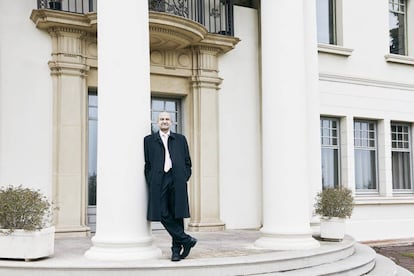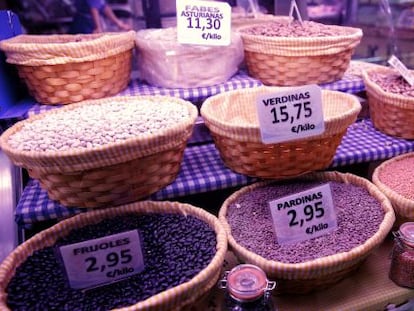¡°White bread is one of the main problems in the Spanish diet¡±
Miguel ?ngel Mart¨ªnez-Gonz¨¢lez is one of the most respected voices in the world of nutrition, specializing in the Mediterranean diet and its potential to combat obesity. A professor of public health at the University of Navarre and visiting scholar at Harvard, he explains the challenge of keeping society healthy in the face of the food industry¡¯s aggressive tactics

It takes less than two minutes to realize that Dr. Miguel ?ngel Mart¨ªnez-Gonz¨¢lez leads by example and walks the talk. He climbs the two flights of stairs to the lecture hall where he teaches?biostatistics to a class of medical students, he takes no sugar in his coffee and when it comes to lunch he chooses lentils over meat and pasta from the menu. This is a man who has spent more than two decades coming up with scientific evidence to support the benefits of the Mediterranean diet.
A professor of preventive medicine at Navarre University, and a visiting scholar at the Harvard T.H. Chan School of Public Health, Mart¨ªnez-Gonz¨¢lez is one of the masterminds behind the PREDIMED (Primary Prevention of Cardiovasculary Disease with a Mediterranean Diet) trials, the most in-depth cohort study to date on the effects of the southern European diet on health.
Involving 7,500 participants from across Spain over a 10-year period, the study showed that following a Mediterranean diet reduces cardiovascular problems by 66%, heart attacks and strokes by 30% and the risk of getting breast cancer by 68%.
What is within easy reach on the supermarket shelves? Highly processed food
In the hallway next to his office on the Pamplona campus, Mart¨ªnez-Gonz¨¢lez has pinned all recently published papers written by his department on a cork notice board. ¡°It's the wall of self-esteem,¡± he jokes. Originally from M¨¢laga, Mart¨ªnez-Gonz¨¢lez, 59, has collaborated since the 1990s on various research projects with the Harvard T.H. Chan School of Public Health, the center of learning for global health leaders. It was here that he got the inspiration and knowledge to set up the PREDIMED trials ? ¨C his findings are now included in the official US guides on nutrition ¨C and also the SUN research program (Seguimiento Universidad de Navarra) in which 22,000 subjects, 50% of them health professionals, have provided researchers with information about their lifestyle and health since 1999.
Now Mart¨ªnez-Gonz¨¢lez has launched the PREDIMED PLUS trials ¨C a cohort study of around 7,000 obese patients over a period of four years with a view to seeing if the Mediterranean diet can help them lose weight and increase their physical activity.
EL PA?S SEMANAL sat down with Mart¨ªnez-Gonz¨¢lez in his study in Pamplona and asked why the Mediterranean diet no longer seems to be working in Spain.
It is already a scientific fact that the Mediterranean diet is a healthy diet. So why has obesity become so widespread in Spain?
Many people say that they follow the Mediterranean diet. But the truth is that the younger generations have mixed it with the American diet. Spaniards now eat too much processed and red meat. I¡¯m not saying we have to become vegetarians, but there is scientific evidence to suggest that there is a drastic reduction in death from heart disease and cancer if we replace animal proteins with vegetable proteins. The Mediterranean diet, meaning extra virgin olive oil, nuts, fruit, vegetables and pulses, is the best option. If you have to eat animal protein, it is better to eat fish than meat, and it is better to eat rabbit or poultry than red meat. It is also a good idea to reduce sugar and salt in the diet and lead a less sedentary lifestyle ¨C climb the stairs instead of taking the elevator, for example.

Why is it so difficult for people to lose weight?
First, because it takes a lot of willpower to drop kilos and not put them on again. But it is also true that a number of companies in the food industry have become so powerful that they have been able to make large quantities of cheap food available to us day and night. What is within easy reach on the supermarket shelves? Usually it is highly processed food, high in calories, stuffed with fat, sugar and salt, which smothers what the food promises to be about, as is the case with ketchup. What has tomato sauce got to do with it? So it sells and it is eaten in industrial quantities. These large quantities and low prices make people fat. We live in a culture that overeats. The healthier options need to be more accessible.
But we know that what the food industry is tempting us with is not particularly healthy and nobody is making us eat it.
Most of the choices we make are not very rational. The economist Richard H. Thaler, a leader in the field of behavioral finance, and Cass R. Sunstein, another behavioral economist, explain this in one of my favorite books, called Nudge. People often go for the easiest option and there¡¯s an industry waiting to nudge us in that direction. That is why I believe that you have to make it easy to be healthy and guide the choices of those who want to eat well. These are public health strategies that can build a healthier society. The default bread should be whole grain, and the default drink should be sugar-free. Thaler and Sunstein call it libertarian paternalism. People should be free to choose but they should be informed and protected against badly thought-out and harmful choices, without forcing them into anything. This is what I teach in my lectures on preventive medicine.
Some food companies have used tactics not unlike those used by the tobacco industry
What do you think of the government¡¯s new tax on fizzy drinks?
I believe that extra virgin olive oil, fruit and vegetables should be subsidized by taxing processed and red meat, junk food and sugary drinks. If you do that, you send out a clear message of what is healthy and what is not.
Is bread part of the Mediterranean diet?
There has been a great deal of debate about this. The conclusion we have drawn is that white bread is one of the most serious problems in Spain. Most people eat it and even stuff themselves with it.? The public needs to know that it is basically starch and our bodies are extremely efficient in turning starch into sugar. It's like consuming glucose. As soon as you put a crumb of it in your mouth, it immediately tastes sweet.
Why does the food industry go to the trouble of refining the flour for bread?

Because refined flour lasts longer. Commercially, it is very useful, but at the cost of removing the most nutritious parts that allow us to absorb the sugars more gradually. When it comes to white bread, we are giving people fast-acting fuel. And when there's already a weight problem and a resistance to insulin, it's deadly. We have to eat less bread and when we do, make it whole grain bread.
Many books now claim that fats are not as bad as we thought, and it is sugar that¡¯s responsible for the obesity and diabetes epidemic. Which is worse, fat or sugar?
Sugar is a big problem. It is added in vast quantities to fizzy drinks, fruit juice and packaged food products. Children get used to the ultra sweet taste and then, of course, they don¡¯t want to eat something like a fresh pear. But it has also been proven that saturated fat has a negative impact on heart health. So both fats and sugars can be problematic.
The food industry says that we shouldn't demonize foods. They insist we should eat a bit of everything.
There is no scientific evidence to suggest that it is better to eat a wide variety of food than to cut some products out. Of course, when it comes to the producer of beef, which message is more in his interest? Obviously, he is going to say that no food should be demonized. The food industry has far more resources at its disposal than public health authorities to get their message across. And there have been cases of food companies using tactics not unlike those used by the tobacco industry, which paid scientists to say that tobacco is not as bad for you as had been believed. They even went as far as to say that the beginnings of lung cancer produced the desire to smoke to relieve the pain. Then there has been money thrown at undermining those of us working in nutrition.
Isn't comparing the food industry with the tobacco industry going a bit far?
Two years ago a report came out in the journal PLoS Medicine based on internal documents from the sugar industry during the 1950s and 1960s. It showed that the sugar companies were perfectly aware of the effects of sugar on teeth. The documents contained details of how they paid scientists to cast doubt on anything that could threaten their business. The marketing experts that were advising the sugar companies were subsequently hired by the tobacco companies, which then employed the same strategies. On the other hand, it is true that in recent years we have seen moves within the food industry to be more responsible and take out trans fats from products ¨C which are the most harmful, to use sweeteners that are lighter on calories and to reduce salt content.
If you have to eat animal protein, it is better to eat fish than meat, and it is better to eat rabbit or poultry than red meat
Have you ever accepted money from the food industry?
On two occasions. The first was when we were refused funding and the SUN cohort was in danger of disappearing. We accepted an offer from Danone to test the metabolic effects of yogurt on obesity. It was 2013 and we got around €40,000. We concluded that the consumption of yogurt decreased the risk of becoming obese, but we also pointed out that the consumption of fruit would do the job more effectively. After the study was published we ended our collaboration and I asked them to refrain from further contact.
Why did you end the relationship?
It¡¯s a very subtle pressure. They asked me to talk at a conference in Boston about our findings on yogurt. I don¡¯t want to be seen at a conference linked to a particular company. I think it is in the interests of everyone that researchers remain independent.
Haven¡¯t you received funding from the olive oil industry?
No. The second time we received money from the food industry was from the International Nut & Dried Fruit Council. We were part of a public tender to finance PREDIMED PLUS because we handed out nuts to the participants. We got €50,000 over a period of two years, less that 3% of the total funding we received during this period. The total funding we received for PREDIMED PLUS has since been made public ¨C it came from the US, Spain and Europe.
There are a number of researchers who accept money from the food industry.
It¡¯s a delicate matter. In 2013, the report we published in PLoS Medicine concluded that studies that were financed by the food industry were five times more likely to argue in favor of the companies funding them. It¡¯s also of interest to compare studies funded by the industry with independent studies. You can never trust studies financed by those who have a stake in the result. You can¡¯t both take part in something and be the judge of it. One way around it would be if the industry contributed to an anonymous fund and had no say in which projects the fund would finance. On the other hand, public agencies should increase their investment in nutritional research. Food is something that affects the entire population.
We have to eat less bread and when we do, make it whole grain bread
Obesity is now a global epidemic.
It is the pandemic of the 21st century and it is on the point of triggering the unique situation that life expectancy in developed societies is going into reverse. This is already happening in the US. A macro study recently carried out in Israel has shown that even people whose weight is only very slightly over the norm have a higher risk of dying from heart disease. The World Health Organization (WHO) has linked obesity to 15 types of cancer. This has an impact on quality of life. That is why we are embarking on the PREDIMED PLUS study, to see if the Mediterranean diet can not only improve health but also help people lose weight.
Is obesity genetic?
It¡¯s hereditary because habits can be passed down from parents to children, but the genetic factor can¡¯t explain the current explosion. There was a very interesting study carried out in Harvard in 2012; they focused on 32 genes related to obesity and they watched what happened when the owners of those genes consumed sugary drinks. If sugary drinks are not consumed, the genes aren¡¯t predictive at all. It is remarkable. It is only when the diet is unhealthy that obesity can be linked to genetics. The role of parents is, of course, crucial as is the role of schools and health professionals, the media and the entertainment culture.
How effective can preventive medicine be?
I started out training to be a cardiologist, but I quickly realized that I wanted to intervene earlier, with epidemiology and the big picture. In the 1990s, preventive medicine was largely overlooked in Spain. But it has gained prestige thanks to medical practices based on scientific evidence. Previously, the doctor relied on inspiration, a clinical eye and experience. Now there are scientific investigations based on the study of 10,000 patients to tell the doctor what tends to occur. Medical language has changed.
It used to be said that a good doctor was someone older with experience.
That was a subjective view. Now there is a more quantifiable, rigorous and scientific basis to qualify what makes a good doctor, though the patient should never lack human kindness and personal attention.
Couldn¡¯t we become obsessed with prevention?
People confuse preventive medicine with early treatment or check-ups. The pillars of preventive medicine are lifestyle and diet. It is simple, at least in theory: don¡¯t smoke, stay slim, keep physically active, eat healthy and control your blood pressure, cholesterol and sugar levels. If these things are under control, heart disease can be reduced by 76%.
Nowadays, cancer can be predicted in a perfectly healthy person just from a simple blood or saliva analysis.
This kind of preventive medicine has very few applications. Very few people can benefit from it right now. There are no resources for it. But eating more lentils and less meat is something everyone can do.
There is a certain insistence on getting people to live longer.
Quality of life is fundamental. It¡¯s what is lost in the case of neurodegenerative diseases. We are currently studying the effect of the Mediterranean diet on dementia, Alzheimer¡¯s and Parkinson¡¯s Disease, and we are already seeing that it is beneficial. I believe the results from this will be out in a year. It¡¯s going to make headlines.
English version by Heather Galloway.


